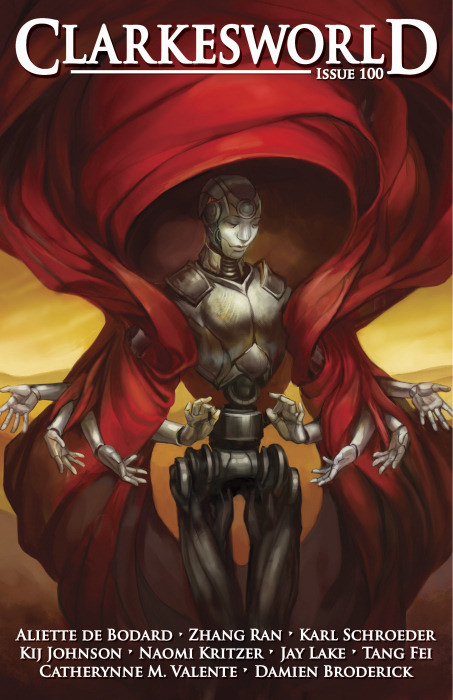Welcome back to the Short Fiction Spotlight, a space for conversation about recent and not-so-recent short stories. For this installment, I thought we’d commemorate the start of the year with a discussion of two freshly published pieces: “A Universal Elegy” by Tang Fei, translated by John Chu, and “The Apartment Dweller’s Bestiary” by Kij Johnson. Both are from the January issue of Clarkesworld Magazine.
These stories are some of the first I’ve read in 2015, from one of the first magazine issues I looked at also—and I think there’s some good stuff, here. These pieces are kept company by other works from writers like Aliette de Bodard and Catherynne M. Valente, Naomi Kritzer and Jay Lake, et cetera; it’s a strong first publication of the year, as is usual from Clarkesworld.
As for these two stories, they struck different chords with me—one is science fiction, the other a fantastical contemporary piece, but more than that, the worlds that they’re exploring resonate on quite separate frequencies.
“A Universal Elegy” by Tang Fei (trans. John Chu) is an epistolary story that deals with one young woman’s relationship to an “alien” and her attempt to live with him on his planet, amongst his people. Of course, she also suffers from what seems to be rather severe mental illness; we’re not quite sure, as the reader, about the veracity of most of the narrative. The balance between the real and the unreal in this story via the unreliable narrator isn’t a particularly original concept, but Fei’s usage of it is intriguing nonetheless.
Irina’s version of events is constantly mediated by her knowledge that her mind is not necessarily a reliable source of information; despite this, there’s a depth and gravity to the story itself that transcends the question of whether or not the whole thing happened as she relates it. The question of completeness—and of incompleteness, of amputations of self—echoes throughout the narrative. Irina seeks to be a complete person, accepting and attempting to make use of her sensory issues and mental instability; her lover, Hull, in the end seeks to give up pieces of himself to forget that he’s been caused pain by her when she leaves.
On the literal level, the revelation that the green vines are actually creatures that consume the parts of people that they no longer want—can no longer deal with—is quite handsome and provocative. The imagery of the partitioned people, functioning as a pair of hands or a torso or a head alone, is also powerful. On the metaphorical level, this thematic statement is also quite strong after the buildup of the narrative itself: Irina is trying her best to be whole and to be with someone else wholly. And yet, that seems nearly impossible—even with a more evolved creature, if we take the events to have literally happened.
There’s something bleak hidden under that, though it seems positive that Irina has come home whole despite the temptation to give up the parts of her that hurt. The balance the story strikes between individual wholeness and the hopelessness of paired wholeness is interesting, and what I liked best about it. The only complaint I’d register is that there are a few small typographical errors that could have been cleaned up—not enough to detract from my appreciation of the piece, but still.
Our other piece, “The Apartment Dweller’s Bestiary” by Kij Johnson, brings us a familiar name with a different sort of tale than Fei’s. It’s a bestiary of the sorts of creatures that live with single adults—in particular, single adults after breakups finding their own apartments, living on their own, or deciding it’s time to move on. It’s a litany of losses, mostly the quiet and unremarkable but terribly intense kind.
While it’s a more personal comment than I’d usually make on a story, I’d note that this piece speaks fiercely and with a sort of tender honest cruelty to a reader who is going through a similar situation themselves. Johnson has captured a spectrum of specific moments of loss and loneliness that fill out a bevy of different experiences—all while constructing a throughline of the things people want, the things people need, out of their lives. And the things that they often don’t get.
This is not a piece with a concentrated narrative like Fei’s, but it definitely does evoke a powerful range of emotions within a certain specific purview; it’s a thematic exploration rather than a plotted arc. I appreciated that for what it did, and how it did it. The piece feels just about the exact right length, with just enough detail in each section to achieve a full snapshot of a moment without overplaying the cards. It’s easy to try too hard on stories like these—stories all about feeling—and make the strings you’re pulling too blatant, but Johnson walks the edge with consummate skill.
It’s a good story, one that will likely speak to some readers more sharply than others. It’s also compact and coherent—and it certainly strikes a nerve. Compared to Fei’s story, it feels like a totally different project; except I suppose both are, in a strange way, dealing with the dissolution of relationships and the failure of people to connect. So, really, I appreciated seeing them both in the same issue. It’s a strong showing and a good start to the year at Clarkesworld.
Lee Mandelo is a writer, critic, and editor whose primary fields of interest are speculative fiction and queer literature, especially when the two coincide. She can be found on Twitter or her website.











Congratulations to Clarkesworld for its 100th issue!